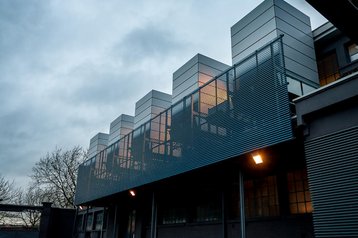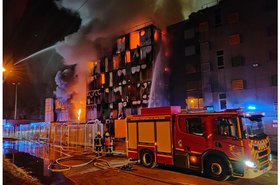OVHcloud's flagship Roubaix campus passed a safety and environmental impact inspection in January, but the investigation found multiple issues with fire prevention systems. The report came out two months before the fire which destroyed its SBG2 data center in Strasbourg in March.
The Roubaix campus undertook a comprehensive risk study in January, mandatory for large sites with potential environmental impacts, known as ICPEs. The Prefecture (local government) approved the site's continued operation, subject to some actions to bring it into line with current regulations. The main actions demanded by the safety report were to increase the level of fireproofing on battery rooms at the eight data centers on the site, to fix a potentially unsafe lightning conductor, and to upgrade the fire hydrant system used by firefighters.
Two months after Roubaix passed its inspection, fire destroyed the SBG2 data center and parts of SBG1 in Strasbourg. There is no equivalent report for the Strasbourg campus, as it does not meet the threshold to be classed as an ICPE.
For breaking data center news, opinions, and features subscribe to DCD's newsletter
ICPE laws
In France, under the Environment Code, sites are "installations classified for the protection of the environment" (ICPEs) if they have a significant risk of pollution or danger to public health. The thresholds for various industries are regularly updated, and the Roubaix campus, with eight data centers, came under the latest version of the Code, so a report was commissioned in early 2021, an OVHcloud spokesperson told DCD.
The results of the full report were published some months ago, but the 64-page fire safety section, produced by Bureau Veritas, was published by French corporate news website JDN this week, along with the conclusion that the French cloud provider should spend €2.9 million ($3.5 million) on upgrading fire safety and environmental measures at Roubaix.
OVHcloud is acting on recommendations including improving the fireproofing on the battery rooms, with works due to be complete during 2022 to 2023.
The report suggests increased fireproofing in battery rooms, an increase in the number of fire hydrants on site; and expresses serious concerns with the placement of lightning rods as well as the absence of lightning protection systems in low voltage switchboards. The report states that measures would need to be taken “for all battery rooms” on site to meet fireproofing standards, with some rooms moved elsewhere to conform to safety requirements.
In line with the report, OVHcloud is increasing the provision of fire hydrants, which were deemed “insufficient in relation to the required needs.” They will be upgraded from 360 cubic meters of water per hour to 420 cubic meters per hour which Bureau Veritas says is needed to serve the facilities. OVH will build an internal hydrant system as well as “an accessible route for emergency vehicles, at the southern end of the site.”
A lightning rod on the site was labeled as “potentially dangerous” because it connected inside the building and could “bring lightning directly inside the building in the event of an impact.” This will be fixed by the end of 2021.
Additionally, inadequate surge protection was identified in all of the company’s facilities except one, specifying that inverters across all remaining sites would need to be installed.
The report reads: “The low voltage switchboards present on site are not equipped with type 1 lightning arresters, except those of Roubaix 7. All the low voltage switchboards and emergency low voltage switchboards at the Roubaix site will need to be equipped with type 1 + 2 surge arresters.”
The report puts the total price of the work at more than €2.9 million ($3.5 million). The majority of this is not a safety measure, but an environmental one: a large tank is required on site, to catch and contain any water used by firefighters in the event of a fire, to prevent pollution washing out to the surrounding environment. This was already under construction by order of the Prefecture, and will cost at least €2.5 million ($3m).
"This is a normal process of protection for the environment. It's a good sign," said an OVHcloud spokesperson, pointing out that the Prefecture has approved the campus's continued activity. "The authorities consider it is okay, and complies with regulations."
OVHcloud's Strasbourg campus is not an ICPE, and Michel Paulin, CEO of OVHcloud, has told customers that the company would not be able to publish the cause of the Strasbourg fire before 2022 - a legal requirement due to the involvement of the French authorities and insurance firms.
Most of the customer services on site in Strasbourg have now been restored, and OVHcloud chairman and founder Octave Klaba has promised that a resilient infrastructure will be established for OVHcloud, which still has plans for an IPO later this year.
Additional reporting by Tanwen Dawn-Hiscox



